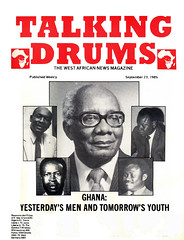Comment
Between Justice And Rights
Unlike the Decree 4, Gen. Babangida is quite likely to discover that the issue of the release of the political prisoners is not going to be a straightforward affair. And as some people emerge from the prisons and house arrests, others enter. What fate was deemed unfair to Shagari and co. is equally unfair to Buhari and co.
As has been stated in this column before, it is difficult to escape the feeling that a large dose of luck has influenced the decision on who stays in or out of jail. And that is a feeling that has persisted since the coup of December 31, 1983, because it was difficult to work out what criteria guided the decisions of the Buhari SMC on the issue of political prisoners. While on the face of it, the impression was that all those who had played significant roles in the political parties and the administration of the country were all to be locked up in jail until proved innocent, there remained outside the jails some people who had been very prominent figures.
When it came to releasing people from the jail also, it was difficult to discern what rhyme or reason guided the exercise. The same could be said of what came to assume the name of the "fugitives" - did that group encompass all former prominent politicians who were outside Nigeria or just one or two names? It became very difficult to discount the charge of a personal campaign against some people.
In much the same way, there was no discernible criterion to judge who appears before the military tribunals and in what order. Were the police or the security services who were 'investigating the politicians doing so in any particular order? Alphabetical or geographical order for example, or was it being done along party lines, ie. if you investigate one former UPN governor you turn your attention to two former NPN governors and then throw in one former NPP governor. Or was it dependent on which former official attracted the most anonymous letters from the public. Or were they selected at random?
Even after people had appeared before these secret Tribunals and been sentenced, the random nature of official treatment continued when the sentences were reviewed. Some people had their 22 year sentences reduced to 10 years, others had theirs reduced to one year while others had theirs confirmed as was passed. Again, no reasons were given. While the prerogative of mercy surely resided with the SMC and Maj-Gen Buhari as the then Head of State, it was difficult to escape the charge of favouritism.
And in the peculiar Nigerian circumstances, many people were convinced that "federal character" considerations were not satisfied. Thus there persists the mounting expectations that the new President, Maj-Gen Babangida will do something to correct these anomalies. But then the entire murky busi- ness will make it particularly difficult to correct to the satisfaction of all. The dispensing of justice cannot and should not be dependent on so large an element of luck, nor on geographical considerations.
It will take a very brave person indeed, to argue that somebody who has spent 20 months in jail without any charges does not deserve to be freed; but then a lot of thought must be spared for those who remain in jail only because they were unlucky enough to have been first in the queue for the tribunals.
Obviously, if the normal course of justice had been allowed to run its way, this present dilemma would never have arisen. While the greater part of the blame will be laid at the foot of the Buhari SMC for having ignored all the legitimate protestations of concerned people who had pointed out these loopholes, some of the blame must go to the departments and agencies charged with the investigations.
If those charged with investigating crimes cannot do their work unless people are locked up in jails, their homes and offices are ransacked and they are presumed guilty until they can 'prove' their innocence, then these officers are obviously failing in their duty and they do not deserve their pay.
When Gen. Babangida says that his administration will respect human rights, it means that no citizen should be a victim of such a process.
However, would not the release of all the politicians reinforce the feeling that society tends to condone the crimes of 'big people' while the poor who step out of line are dealt with ruthlessly?
It is imperative that such an impression is not given in the attempt to correct some of the injustices of the past. It is difficult to advocate that the individuals who have been the victims of the injustice should remain in their predicament to satisfy such a need. It is not their fault that they were not subjected to the normal and traditional course of justice in Nigeria and it will be a very brave person indeed that will not see twenty months of trauma and nightmare as qualifying them for freedom.
The committee that has been promised to review the cases will necessarily have to conduct its affairs in the open if it is to gain any credibility from the public. And it is not going to be easy to tackle such a job in the open when they will be dealing with matters that were conducted in secret and under a different atmosphere altogether. As the whole of Nigeria holds its breath and waits for the October 1 speech that the President is widely expected to make, these are some of the matters over which he cannot fudge.
But most important, the problems of Nigeria, as we have stated ad nauseam, ought to be discussed by the whole of Nigeria. President Babangida would have delivered on his promise if he approved a programme of transparency.
